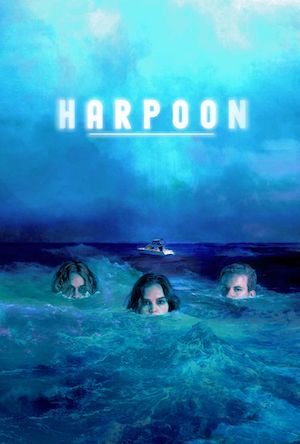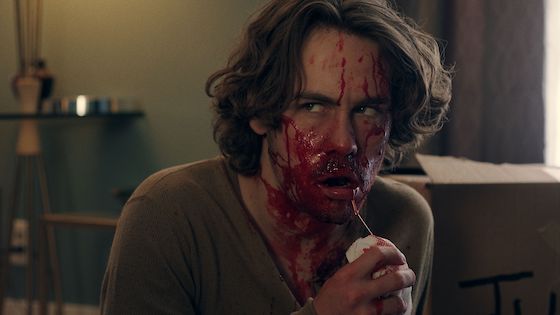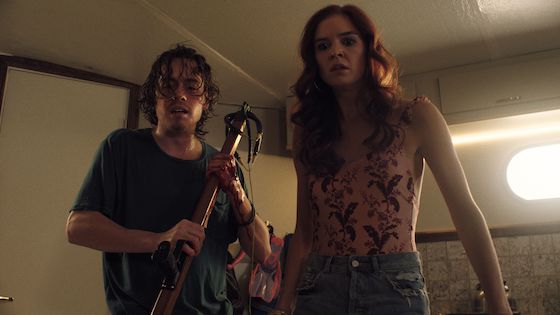If you’re a fan of genre cinema, actor Munro Chambers is a rising star. After growing up, appearing on Canadian television series, he came to the attention of many fans when he appeared in 2015’s retro-action post-apocalypse sci-fi horror film, Turbo Kid. It was an utter joy to watch Chambers take on hoards of mutant freaks. Then, last year, the actor appeared in one of the best small-ensemble black comedies we’ve seen in years, Harpoon, wherein his character undergoes transformations both physical and emotional, really making for a bleakly hilarious viewing. We spoke with Munro Chambers by phone about his career, and the intricacies of Harpoon.

Is it a requirement that all Canadian actors have to appear on either Degrassi and/or Corner Gas?
Yes. It is written in the contract. There’s a birth certificate clause that you see and you must be a part of it. [laughs] No, not at all. It’s just like any community. It’s a small community, and it’s a great show that has a lot of characters, and a lot of great ensembles. So, when you’re young – or even your late 20s and 30s – at some point, you’ll get on it.
You got your start in television and it seems like you’ve continued that on, but it seems like you’ve been steadily ramping up the films you’ve appeared in over recent years. What’s that process been like?
It’s wild. In my experience, it wasn’t something I ever chose. I like to see where things fall and just to kind of ride the wave, so when I when I was very very young, it started off with TV, and then it was a lot of films. Then, when SARS hit Toronto, there was a big gap there where nobody really worked in Toronto. There were some in Vancouver, but a lot of productions didn’t come didn’t come here, so there’s a little gap there where I didn’t work.
Then, out of nowhere this audition for TV sitcom on Family Channel came up, and then from that just sprang an eight-year span of doing television through The Latest Buzz and Degrassi and some other things. Everything after Degrassi is kind of leading to a job that just kind of came up, which was Turbo Kid and from that kind of sprung off films.
I think it’s nice – at least in my personal experience and in my career and the way it’s gone for me – is that it’s nice to not be like, “Oh well, now I’m choosing film,” because because it’s so unpredictable, this industry. Just ride the wave and enjoy it. I’ve been very very very fortunate that one’s kind of led to the other and some really great projects of falling into my lap.

Is it that Turbo Kid being a genre picture has led to other genre pictures or is that also something you’re choosing to work towards?
I think Turbo Kid spawned it. It wasn’t something that I chose. It’s something I’ve always wanted to do. In specific genres, like with the horror/thriller side, I never had truly a great desire. There was a couple ones where I’d love to be the antagonist, or would love to be the villain, but I just never thought I’d ever get cast in those roles – especially with Knuckleball and Harpoon, I just never thought I’d ever get cast.
The fact that people were giving me that opportunity to try that out, and to flex muscles I feel like I’ve worked on over my career, was a real joy, but Turbo Kid is really what spun that. That was the one that kind of initiated the genre films, especially the indies that have just been so much fun. I find with the genre – the “genre” genre – in that corner of the industry, there’s so many unique scripts out there, and not one is like the other or similar with little tweaks. It’s a lot of freedom to be creative and to be bold and to do something different, and that’s something that I’ve always aspired as an actor.
When you say you didn’t think you would get cast in something like Knuckleball or Harpoon, what do you mean: is it because those characters are a little less black-and-white than some of the other parts you’ve played?
A friend of mine put it towards me that was an incorrect interpretation of the way I perceive myself. As an actor, you always try to transform into something else. You put yourself in their shoes and imagine yourself as this, that, and the other, but there’s always a little bit of that third eye that looks at yourself: “Yeah, well, I’m not really that,” and so they got a little bit into that where I thought, “Maybe I’m not scary enough, I look a little too young, look a little this, look a little that,” and then when these roles started to come my way – Michael Ironside is a very good friend of mine, and he said to me, “That’s only your interpretation that you wouldn’t be cast like that and some of the people may not, because it’s opening the door to it.”
But, even [Michael] Peterson said he had a different idea for [Knuckleball‘s] Dixon, until we started really playing with it so, to be given that opportunity to try different things, it’s just your own interpretation, and then they get to make the tough choice of if they want you or not, and luckily for me, it worked out well.

The reason we’re talking is Harpoon and Harpoon is a film in which, what you think the characters are at the very beginning, shifts and then shifts again, and then shifts some more. Was that part of the appeal when you read that script: that you get the opportunity to play a very fully fleshed-out character?
100%. I really love characters that are just more than just meets the eye. I love the imagery of an iceberg, of what’s below, and then what’s on the surface. All three of these characters have that. Maybe they show you something at first and then, over and over, more layers are peeled away, and there’s something completely different. That was the same thing with Dixon – the same thing, a little bit more turbid, where he’s more black and white a little bit.
I was always amazed by actors that had a complete range in their catalog of performances, so the main one I always go to is Robin Williams. How he did do Mrs. Doubtfire and then The Fisher King? That just amazed me. Then, you look at Gary Oldman, and you look at Glenn Close, and these incredible actors that are just, like – how did they do that? How can they touch so many ranges, where they make you laugh and smile and cry and feel fear and grief and do all that? Anything that kind of leads towards that, I’ve always wanted to jump to it and Harpoon had that.
Part of Harpoon‘s appeal is this narration by Brett Gelman. It’s interesting, because you get like a lot more backstory on the characters than you usually get for people in most films. Did reading that narration help you in developing Jonah?
Yeah, absolutely. It always helps. That’s the beauty of film, opposite of of TV – where when you’re doing episodics, if you’re starting it off and they do the pilot and then it leads on, you don’t get the ending story. You don’t get how it fully ends or the beginning, and you don’t know, so with the film, you get everything – or mostly – but it definitely helped.
The dialogue that Brett Gelman did in the original scripts was kind of a little bit different than what it ended up being, which it usually does, but Rob Grant had such a such a clear mindset of how he wanted these characters and their history. When we were doing rehearsals before the filming – which I think was two or three days in Calgary – we really hashed it all that out, and we actually were able to give our own interpretations, and throw in our our own mindsets.
I’m like, “Oh, what were we like when we were kids? What were our interactions? Me and Emily [Tyra]: when we had that night? Let’s dive even further into how that night happened and went. Maybe there was times before where it almost happened.” It was a really creative process. It wasn’t just like everything on the page – it was that we actually got to be involved.
One of the things I find really fascinating is, when I was reading the backstory on the production of the film, is that it’s a film that takes place in very warm, lovely weather, and you shot the majority of the interiors in Calgary. How does that affect your performance, when it’s freezing cold outside but you’re having to pretend that it’s in the middle of a very lovely ocean?
Well, the studio was heated, to a degree, but when we’re running through certain takes it was easier. It was weird. It was wild. They did such a great job with set dec and making it look great, like little things with the way the sun would peel through the windows. I don’t know what it was. When they call action and slaps, you just do it. There’s no easy way about it.
For me it was a little easier, because my character – if you haven’t seen this, spoiler alert – loses a lot of blood, so there’s certain things that the body goes through that could mirror being cold or freezing. There’s parallels there, so it’s like, “Okay, if I’m feeling this, well, I’ll just use it,” and then you kind of add a little bit more – especially when you’re covered in blood – but, no, it definitely helped with everything.
Also, just it helped with that isolation, We were all in it together, and we were all just kind of fully invested and so, even if we were cold, or if we were a little bit under the weather, the production did a great job to make sure it wasn’t too cold, but it was a lot of fun.
Speaking of losing a lot of blood, one of the things I wanted to talk about was the the violence in this film, especially towards you. Pardon my language, but you get fucked up in this movie. Harpoon begins with you just getting the shit kicked out of you. It seems like this – and, to an extent in Turbo Kid – you play characters who get knocked down a lot?
Yeah, I don’t know why that’s been kind of like my spell for the last five years, where I’ve died a lot. I think I’ve had like, six deaths in five years, but you know, it’s always fun, because as an actor, it’s so vulnerable. With the words, “I love you,” “I need you,” “I miss you,” or “I hate you,” those are things you can say, and they’re really really tough, but when you’re being beaten down like that – especially with Turbo Kid, where he has to show his strength, and for this one, where he’s trying to hide his secrets, and he’s trying to do it for what he believes is the greater good – oh, it’s fun, when you have someone like Chris [Gray] who’s just throwing haymakers.





Comments on this entry are closed.